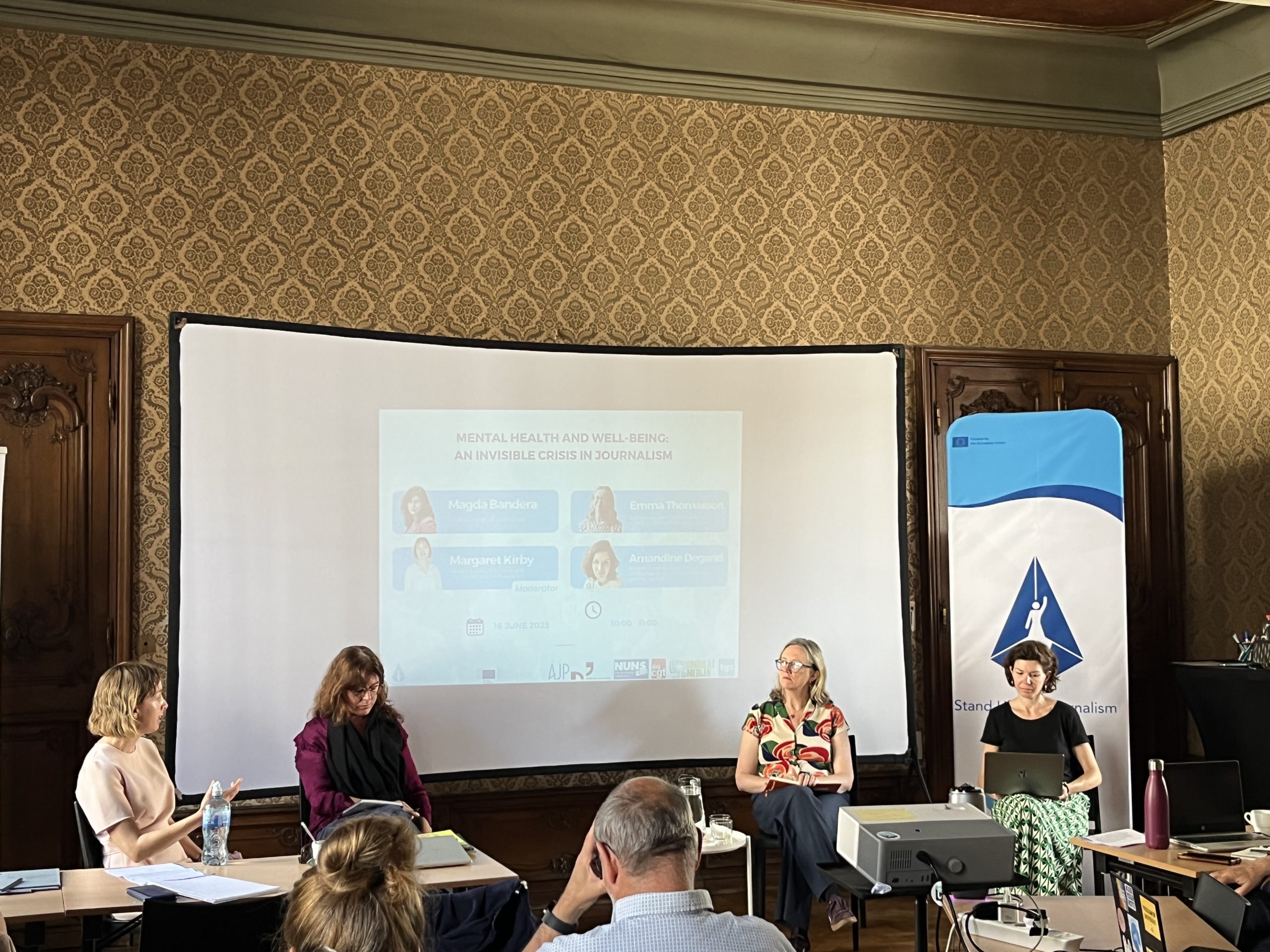Organised in Namur (Belgium) on 16-17 June 2025, the fourth ‘Stand Up for Journalism’ workshop was dedicated to the mental wellbeing of journalists. The European Federation of Journalists (EFJ), in partnership with its Belgian affiliate the Association des journalistes professionnels (AJP), gathered 35 union representatives and experts from 13 countries to discuss how to support journalists’ organisations in tackling psychosocial risks that are increasingly affecting journalists, such as burnout. Solutions identified include stronger legislative frameworks, development of in-house programs such as peer support, and trainings, especially for managers.
Many studies throughout Europe show that journalists are workers at high risk of mental health issues due to the nature of their job and lack of organisational support. Low income, precariousness, poor work-life balance, and limited ability to disconnect or set boundaries, create fertile ground for stress, anxiety, sleep disorders, depression or burnout. And they are all too often considered to be part of the job.
In particular, precarious economic conditions are the main cause of the deterioration of journalists’ wellbeing. According to a 2023 survey on the mental health of journalists in Italy, presented by freelance journalist and FNSI member Alice Facchini, more than 50% of the respondents felt that stress, anxiety, loneliness, insomnia, were largely induced by economic factors (84%) and the working atmosphere (63%).
In this context, it is not surprising that young journalists are not spared. Belgian researcher and professor at IHECS Amandine Degand has observed a form of disillusionment among young journalists who suffer burnout very early in their careers and tend to leave the profession after a couple of years. Additionally, journalists in managerial positions – generally former journalists – are also seriously affected. They report a lack of adequate training to supervise with empathy and listening, while being themselves subject to pressure from the top.
An organisational issue
“It was the best job, and then I had kids,” said Emma Thomasson, media trainer and coach at The Self-Investigation, and former bureau chief at the global news agency Reuters. Motherhood marked a turning point in her career which eventually led her to burnout. “It was when the stress stopped that I collapsed.” At Reuters, Thomasson helped to develop a Peer Support Network across 26 countries. While the 70 peers were not professional psychologists, they were trained in active listening and self-care. “The peers made it acceptable to ask for help. A lot of people eventually went to therapy,” she explained. In Germany, a peer support programme called Helpline has also been launched, providing free-of-charge moral support to journalists throughout the country.
While peer support at the workplace can be a non-costly and efficient way to provide safe space for journalists to discuss their issues at work, the need to change the culture and to find structural solutions is pressing. Participants agreed to frame the conversation about mental health as an organisational issue that affects all workers, rather than viewing it as solely an individual or women issue. While employers have a duty of care and legal obligations to fulfil, mental wellbeing tends to be relegated to second place, physical safety being the priority for many media outlets and journalists.
“What we need to do is not only take care of people suffering burnout, but also prevent it, by working on organisational care and ensuring collective bargaining. In Belgium, we have solid legislation, but it is not enough, because we see many people suffering from mental health problems”,” said MEP Estelle Ceulemans (S&D, Belgium), who is calling for an EU directive on psychosocial risks.
The European Union could provide the legislative framework needed to clarify employers’ obligations to assess and mitigate psychosocial risks in all sectors. The European trade union movement, led by the European Trade Union Confederation (ETUC) and Eurocadres, is advocating for a stand-alone legislation. The EndStress campaign aims to gather the necessary political support from the European Commission and Parliament.
This 18-month project is led by EFJ and is implemented with its partners: Independent Journalists’ Association – NUNS (Serbia), Trade Union of Media of Montenegro – TUMM (Montenegro), Danish Journalists’ Union – DJ (Denmark), Turkish Journalists’ Union – TGS (Turkey), Syndicat National des Journalistes – SNJ-CGT (France) and Association Générale des Journalistes – AJP (Belgium)
![]() This project is co-funded by the European Union. Views and opinions expressed are however those of the author(s) only and do not necessarily reflect those of the European Union. Neither the European Union nor the granting authority can be held responsible for them.
This project is co-funded by the European Union. Views and opinions expressed are however those of the author(s) only and do not necessarily reflect those of the European Union. Neither the European Union nor the granting authority can be held responsible for them.
Source: EFJ




